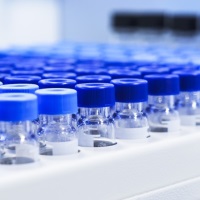Researchers warn scientists of costly impure chemicals

Keele University researchers have published a paper recently warning fellow scientists of impure reagents that could skew results.
The research was carried out by Keele’s Dr Sharon Owen, Dr Heidi Fuller, Mr Phil Jones and Professor Sally Roberts at the RJAH Orthopaedic Hospital in Oswestry, part of Keele University’s Institute of Science and Technology in Medicine, and assisted by scientists in Cardiff and St Andrew’s Universities.
The study, published in Bioscience Reports, found that commercial reagents, which were purchased from highly respected companies, were not pure but contained many contaminants which had a huge and potentially misleading effect on the scientists’ work.
Professor Roberts said: “We have found that commercial preparations of these particular chemicals were very impure, containing many other components which actually affected our results.
“We came by these findings by chance as our laboratory purchased the biomolecules from a well-established supplier to investigate their effect on nerve cells but anomalous results forced us to test their purity. We were studying what controls nerves growing into patients’ intervertebral discs to try and help us understand what causes back pain in a particular group of people.
“Using mass spectrometry and qualitative Western blotting, we discovered unacceptable contamination with other biologically active molecules.
“Reagents that are misleadingly labelled can waste researchers’ funds and time. Testing these molecules can be very expensive and time consuming and not all scientists will have the equipment or finances to do so. One purchase costs hundreds of pounds for just a few milligrams and then for it to be impure is even more costly, because it wastes valuable research time and other resources.
“Most importantly the wrong results can distort important scientific experiments. What is interesting is that many branches of science and medicine have been looking at this molecule (and bought the same material as we did from the same company), ranging from glaucoma and diseases in the eye to studies on malaria.
“It’s very important for scientists to be aware of this when buying commercial reagents.”
Unfortunately, the effect of these impurities may have already interfered with experiments leading to inaccurate conclusions and reports by scientists.

